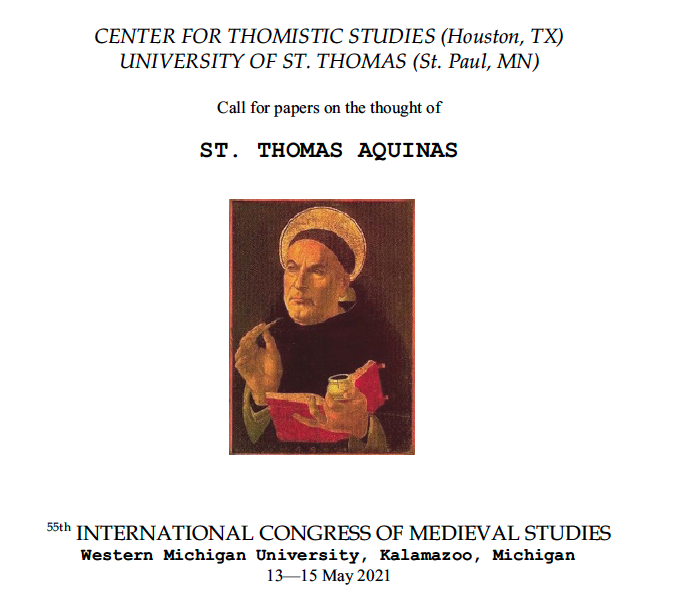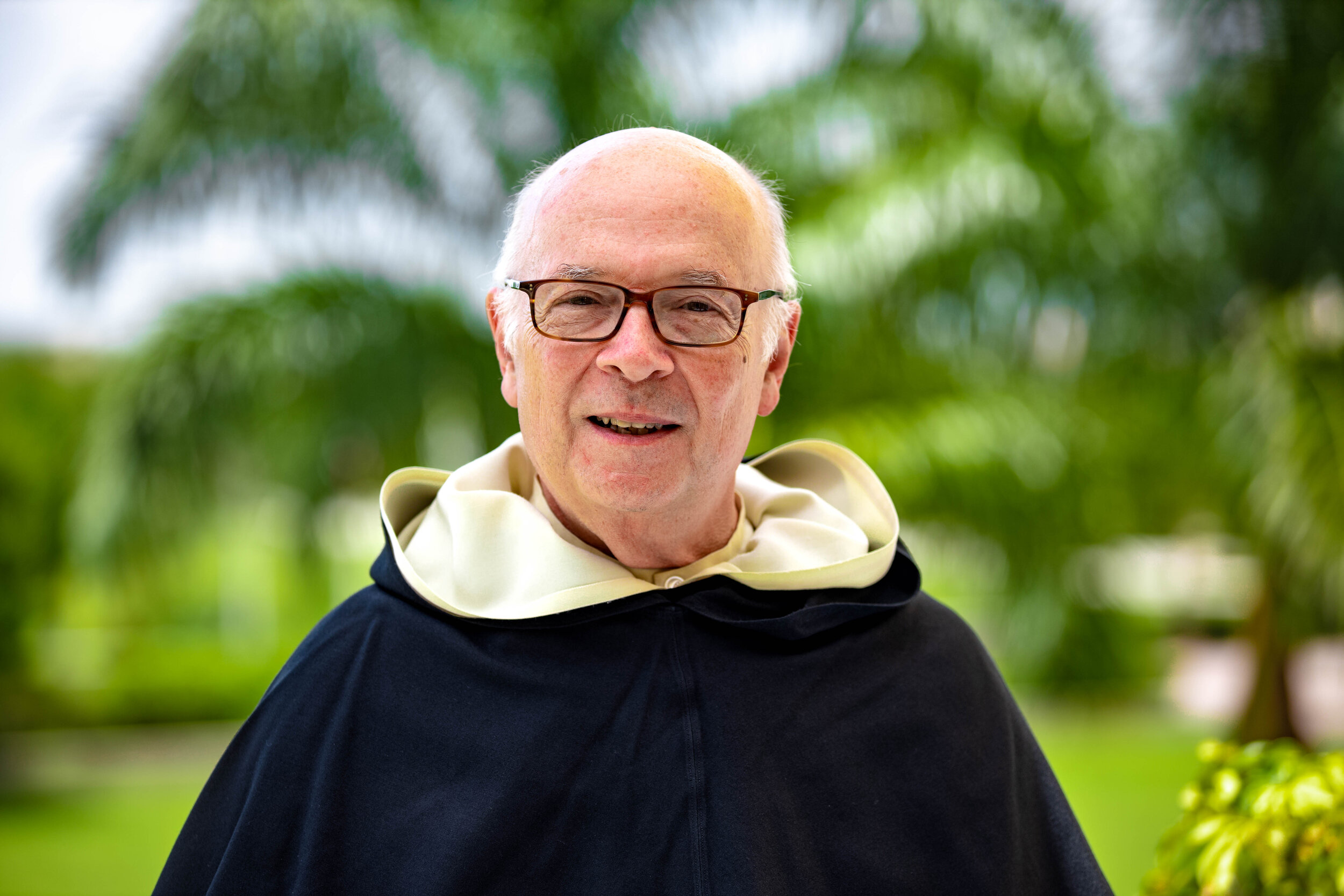Overdue from Thomistica is a review of recent issues of The Thomist (vols. 83.4 and 84.1) and the American Catholic Philosophical Quarterly (94.4). Surveying some of the articles from these issues below, we highlight points and topics both perennial and pressing which may be of interest to our readers.
– ACPQ, 94.4
In his “Determinate and Indeterminate Dimensions: Does Thomas Aquinas Change His Mind on Individuation?”, Gaston LeNotre challenges the consensus view that Aquinas "wavered in his opinion about whether determinate dimensions or indeterminate dimensions serve in the individuation of corporeal substances.” The philosophical context is the interpretive key: “Determinate dimensions resolve a problem in the order of perfection, and indeterminate dimensions resolve a problem in the order of generation.” On the whole, LeNotre’s painstaking work promises to clarify important distinctions in the metaphysics of the composition and individuation of material substances.
Matthew McWhorter argues in “Aquinas and the Moral Virtues of a Christian Person” that the Christians's acquired moral virtues, present during this life, will pass away in the life to come. A wide array of views are taken of St. Thomas’s teaching concerning the moral virtues which are naturally acquired as opposed to those which are infused by grace. McWhorter reviews those in favor of their coexistence and subordination, the composition as a unified habit “comprised of formal (infused) and material (acquired) elements,” a transformational approach, which “asserts that the acquired moral virtues are intrinsically changed when taken up into Christian life,” and the abolitionists view which thinks that “a Christian person no longer possesses acquired moral virtues, only gratuitous moral virtues.” McWhorter aims to conciliate all of these views as having grasped only elements of Aquinas’s overall account.
Robert McNamara's “Edith Stein’s Conception of Human Unity and Bodily Formation: A Thomistically Informed Understanding” proposes that Edith Stein creatively appropriates key concepts of Aquinas's anthropology regarding human unity and bodily formation, “reinterpreting the meaning of these teachings through performing a fresh phenomenological investigation.” This investigation must navigate between Aquinas’s defense of the unity of the substantial form and pluriformism: “[T]hough Stein follows Aquinas in affirming the unifying and formative primacy of the rational soul, in contrast to Aquinas she argues that the human being is best described in terms of a ‘formal structure’ and ‘formal framework,’ with substantial unity secured by the ‘spiritual soul’ as the ‘ruling form’ or ‘dominating principle of form.’”
St. John Henry Cardinal Newman once ended a sermon on perfection by saying: “Go to bed in good time, and you are already perfect.” Brandon Dahm’s “The Virtue of Somnience” draws on the virtue-ethics tradition of Aristotle and Aquinas to propose that somnience as a form of temperance: “Somnience is the virtue of thinking, desiring, feeling, and acting with wise moderation—as one should—about sleep.” It is, Dahm argues, a needed virtue that “connects to a number of other virtues, which helps us fill out the nature of the virtue,” and aids in the formation of virtue. This reviewer hopes to study Dahm’s article closely, but only after a good night’s sleep.
– The Thomist, 83.4
The same Brandon Dahm coauthors “Thomas Aquinas on Separated Souls as Incomplete Human Persons” with Daniel De Haan. They propose a via media in the seemingly intractable recent debate between the corruptionists and the survivalists. Is the human soul after death a person or not? The survivalists say yes, the corruptionists say no. De Haan and Dahm argue that “the separated soul is an incomplete person” because it imperfectly satisfies “Aquinas’s criteria for personhood.” On the one hand, the corruptionists have an “indestructible” textual case that the separated soul is not a person, but, on the other hand, cannot exclude the philosophical case which De Haan and Dahm make for the incomplete person, which is based upon Aquinas’s own “distinction between a complete hoc aliquid and an incomplete hoc aliquid.” While they end with the observation that “our conclusion will not be the final word in this debate,” some have hopes that it will, in fact, be among the final nails in the debate’s coffin.
In “Three Sixteenth-Century Thomist Solutions to the Problem of a Heretical Pope: Cajetan, Cano, and Bellarmine,” Christian D. Washburn examines the theological views of Cardinal Cajetan, Melchoir Cano, and St. Robert Bellarmine concerning the possibility of a heretical pope. Washburn concludes that all naturally agree on the basics of papal infallibility, that this infallibility is divinely revealed, which revelation and its traditional infallible elaboration is binding on the pope. This does not prevent the pope, however, from falling into serious doctrinal error for which he could be tried by a council for heresy. However, at this point—regarding the fact and conditions of such a trial of —their views diverge. Nonetheless, “Cajetan, Cano, and Bellarmine provide insight not only on the nature and extent of papal power, but also its limits. Their teaching on the primacy of God’s word and the authority of tradition also helps us to better understand Dei Verbum 10: ‘the teaching office [of the Church] is not above the word of God, but serves it, teaching only what has been handed on.’”
Rik Van Nieuwenhove’s “Saint Thomas Aquinas on Salvation, Making Satisfaction, and the Restoration of Friendship with God” attempts to refute claims that Aquinas's “alleged incipient penal notion of salvation” is “a precursor to later Calvinist doctrine.” It examines the “plurality of models” used by Aquinas in his account of human redemption, arguing that “Aquinas’s soteriology cannot be reduced to the notion of making satisfaction. As in a symphony, every movement or model (merit, satisfaction, redemption, sacrifice) is multi-layered and recalls previous elements, with a cumulative effect.” Indeed, it is “through charity” that “Christ’s satisfaction compensates for sin. ... In short, the central role charity occupies in Aquinas’s soteriology explains why God’s justice is always predicated upon divine mercy, and why penal readings are less than convincing.”
In her “Feminist Christology: A New Iconoclasm?,” Sr. Sara Butler draws upon St. Theodore the Studite to show that his writings against iconoclasm provide a basis to “[meet] the objections posed by feminist Christology” which questions “the theological significance of Christ’s own maleness.” That is, just as recent feminist theologians propose an analogous “iconoclasm,” Sr. Butler responds in kind by drawing suggestions from a Father of the Church defending icons depicting Christ. Specifically, St. Theodore’s arguments suggest ways to answer or qualify feminist theologians’s claims that Christ’s being male is “only one ‘historical particularity’ among others” and thus not significant, theologically speaking, that what is significant is his “humanity, not his male sex,” and that the resurrected Christ “transcends sexual identity.” Analogous to the ancient iconoclasts, feminist Christology “fails to grasp (or accept) the teaching of the Second Council of Constantinople on the hypostatic union” and likewise runs afoul of the arguments of the Studite.
– The Thomist, 84.1
Gregory M. Reichberg’s “Scholastic Arguments for and against Religious Freedom” discusses the dichotomous stance of the scholastics “in line with Aquinas and indeed the wider Latin tradition that stems from St. Augustine,” namely, that they “were highly selective in their appeals to religious freedom: affirming some of its modalities and denying others.” St. Thomas’s defense of conscience and his defense of coercion are examined alongside Vitoria and Suárez for the sake of the light these shed on contemporary discussions of religious freedom, especially in regard to Dignitatis Humanae. While the views of Melvin Endy, Thomas Pink, Mary Keys, and Charles Journet, among others, all make an appearance, the focus of Reichberg’s essays is Aquinas, Vitoria, and Suárez. He concludes that “Aquinas’s contemporary disciples accordingly face a quandary. If we seek support in his teaching for a right of religious freedom—along the lines of Dignitatis Humanae—we can either downplay the aspects of his teaching that cut against it or offer some account of how the affirmation of this right can be detached from the restrictions he placed on it.” As for St. Thomas himself, Reichberg proposes that “were he writing today, [Aquinas] would surely amend the social and political aspects of his theology to fit the new expectations of our age and the underlying legal codes, civil and ecclesial, that have accordingly emerged.”
Fr. Andrew Hofer, O.P., in “Humbert of Romans on the Papacy before Lyons II (1274): A Study in Comparison with Thomas Aquinas and Pope Gregory X’s Extractiones,” compares the views St. Thomas with those of Humbert of Romans (1254–63) the fifth Master of the Dominican order in regard to the office of the papacy. These are “mutually illuminative,” insofar as Humbert “offers additional practical insight and frank criticism for understanding the papacy, not found in Thomas.” Fr. Hofer considers Humbert’s writing on that office, the Opus tripartitum, in comparison with the Extractiones, the “working notes” of the pope at whose request it was composed, Gregory X. He proposes that by putting these three in concert, “theologians and historians can better understand the complexity of arguments concerning the papal office on the eve of the Second Council of Lyons, and so contribute, in some very small part, to a better understanding of the papacy both in its historical development and in its exercise today.”
Michael Gorman’s “Using Models for the Hypostatic Union: Lessons from Aquinas and Scotus” gets its start from “a misunderstanding of how Aquinas uses models, and out of a misunderstanding of how models ought to be used” when it comes to contemplating Christ’s hypostatic union. The various philosophical comparisons that are made in this context, based upon what is better known to us naturally (e.g., a whole and its parts, or a subject and its accidents), become models when used in a thoroughgoing theological endeavor. Aquinas uses a variety of comparisons when discussing the hypostatic union (including both the aforementioned); Scotus favors the comparison to subject-accident union. Gorman examines the use to which Aquinas and Scotus put their models, and then turns from these historical lessons to draw normative ones about such theological models. We ought to model our approach to theological models upon Scotus and Aquinas for the sake of doctrinal clarification by comparison and contrast, to ground sound pedagogical method, and to harmonize faith and reason by using models as the natural analogs or “pro-examples that demonstrate the possibility of satisfying a certain necessary condition of a theological mystery’s being true.”
The issue concludes with “The Christological Character of the Beatific Vision: Hans Boersma’s Seeing God,” Michael Root’s essay-length consideration of Boersma’s book defending the beatific vision as the purpose of human life. He first lays out Boersma’s argument concerning the beatific vision “as a vision of God in and through the humanity of Christ.” Instead of the “unity model” which “stresses our unity with Christ, with whom we will see God,” Boersma’s is an “object model” which “stresses Christ in his humanity as the immediate object of the beatific vision, in whom we will see God.” The difficulty is that Boersma’s thesis seems to fall under the condemnation of Benedictus Deus (1336). Root’s main question, then, is “[s]hould the Catholic theologian affirm his proposal?” His answer is in the negative: “[I]n constructing his solution Boersma takes a significantly wrong turn, a turn with deleterious theological effects, and one which the Catholic theologian cannot affirm. Fortunately, there are in the tradition at the center of his criticism the resources for an alternative that addresses his problem in what I believe is a more fruitful manner.”








